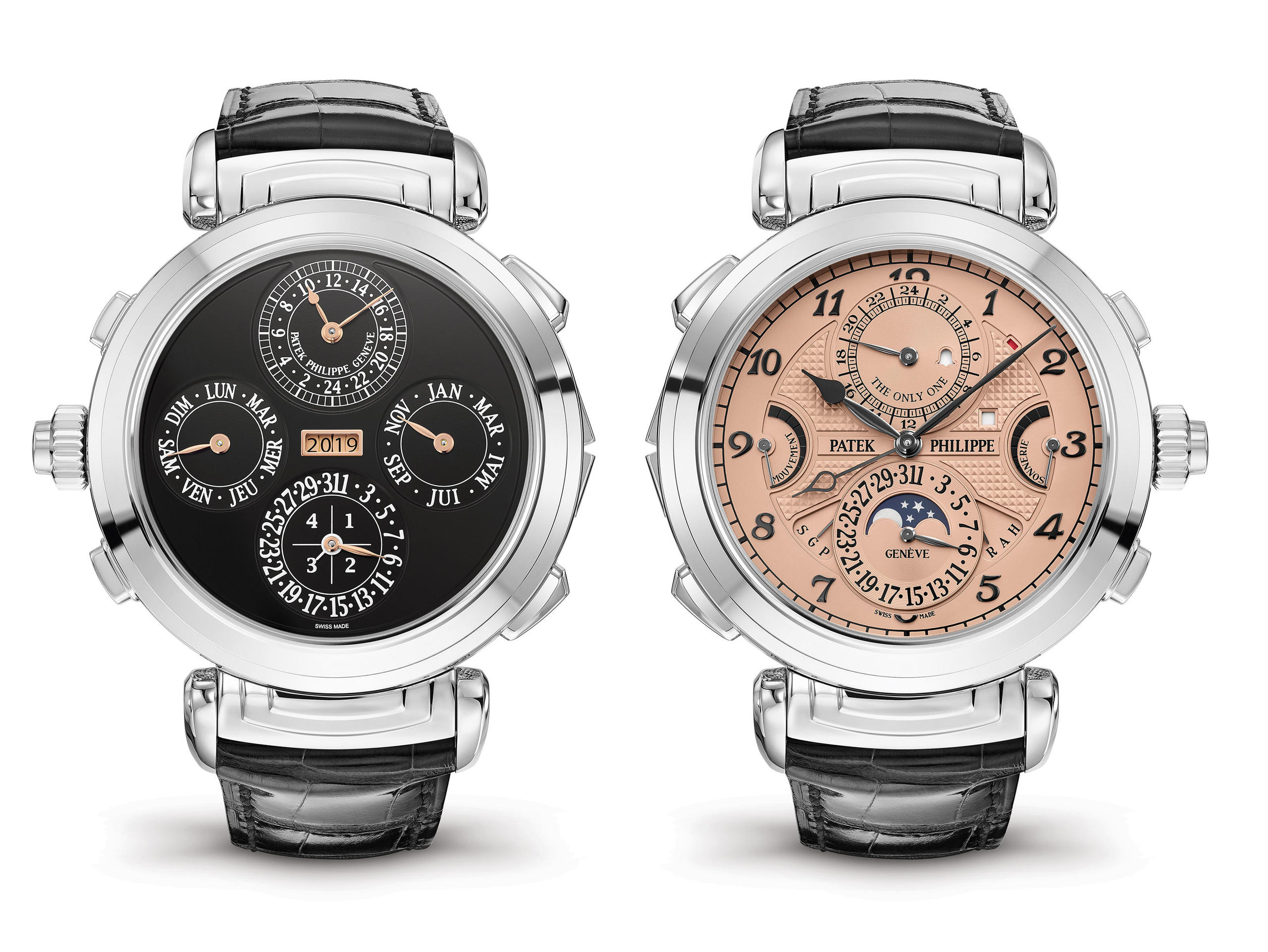The $31 million watch and other Swiss price world records

A CHF640 ($645) bar of chocolate is a sign of either the end of civilisation or a healthy market economy. Whatever your view, Switzerland holds several world records when it comes to expensive goods.
The watch
“As the hammer came down on $31 million (CHF30.6 million), the audience leapt as one to its feet, erupting in wild cheering and thunderous applause,” the Financial Times wrote on November 11External link as a world record was set in Geneva for the highest price of a watch at auction.
The Grandmaster Chime had been launched in a limited series to celebrate Swiss watchmaker Patek PhilippeExternal link’s 175th anniversary in 2014 and was priced at around CHF2.5 million. The example sold on November 11 is the only one made in steel. It features two dials (one on the back), 20 special functions and five chiming modes.
The watch was sold at a charity event in which watchmakers offer one-of-a-kind timepieces to raise money for research into Duchenne muscular dystrophy.
Geneva’s auction houses are no strangers to world records, whether it’s diamonds or wine.
The chocolate
Probably best not to hang this little stocking filler over the fire: an 80g bar of “La ChuorsaExternal link” chocolate, made by Zurich chocolatier AttimoExternal link, costs CHF640 ($645). At CHF8,000 per kilo, this was recognised by Guinness World RecordsExternal link on October 31 as the most expensive chocolate in the world.

The ingredients include saffron grown in the Swiss village of Mund, crystallised orange crisps and 68% Chuao chocolate from Venezuela, which, according to Attimo, is of such quality that “the world’s best chocolatiers must place orders 19 years in advance”.
The drug
How can a drug cost $2.1 million (CHF2.08 million)? In May, US authorities approved a gene therapy from Swiss pharma company Novartis to treat a deadly childhood disease, spinal muscular atrophy, making it the most expensive drug ever. Can such a price tag be justified?
Novartis CEO Vas Narasimhan argued that gene therapies offer hope of a cure for deadly genetic diseases with a single dose. The current alternative for spinal muscular atrophy is taken four times a year for life, costing $750,000 for the first year and then $350,000 per year after that, so about $4 million per decade.
Nevertheless, critics had many questions, including how the drugs are priced, whether they actually work and the ethics of manipulating genes – not to mention who will actually pay for the treatment.
Meat
Switzerland has the highest meat prices in the world, according to the Meat Price Index 2017External link: 142% more expensive than the global average – well ahead of runner-up Norway (64%). Chicken is particularly pricey.
Reasons for these prices include high production costs (salaries, energy, fertiliser, veterinary bills, construction costs, insurance and animal feed) as well as adhering to minimum animal welfare standards.
What’s more, prices are adapted to what consumers seem to be willing to pay. According to a 2016 survey, the Swiss are prepared to pay up to 27% more for local beef, chicken or pork than imported cuts of meat.
Fun
If it’s cheap recreation and entertainment you want, you might think twice before heading to Zurich or Geneva: the two Swiss cities are the dearest in the world for these two categories, according to the Worldwide Cost of Living Survey 2019, published in March by the Economist Intelligence Unit (EIU).
“This perhaps reflects a greater premium that those cities or people in Switzerland in general place on discretionary spending [on non-essential items],” said report author Roxana Slavcheva.
Recreation and entertainment is “the price of a television, a PC, a subscription to a newspaper or magazine, the price of cinema tickets, theatre tickets, restaurants – the cost of going out”, she said.

More
How to save money in Switzerland

In compliance with the JTI standards
More: SWI swissinfo.ch certified by the Journalism Trust Initiative













You can find an overview of ongoing debates with our journalists here . Please join us!
If you want to start a conversation about a topic raised in this article or want to report factual errors, email us at english@swissinfo.ch.